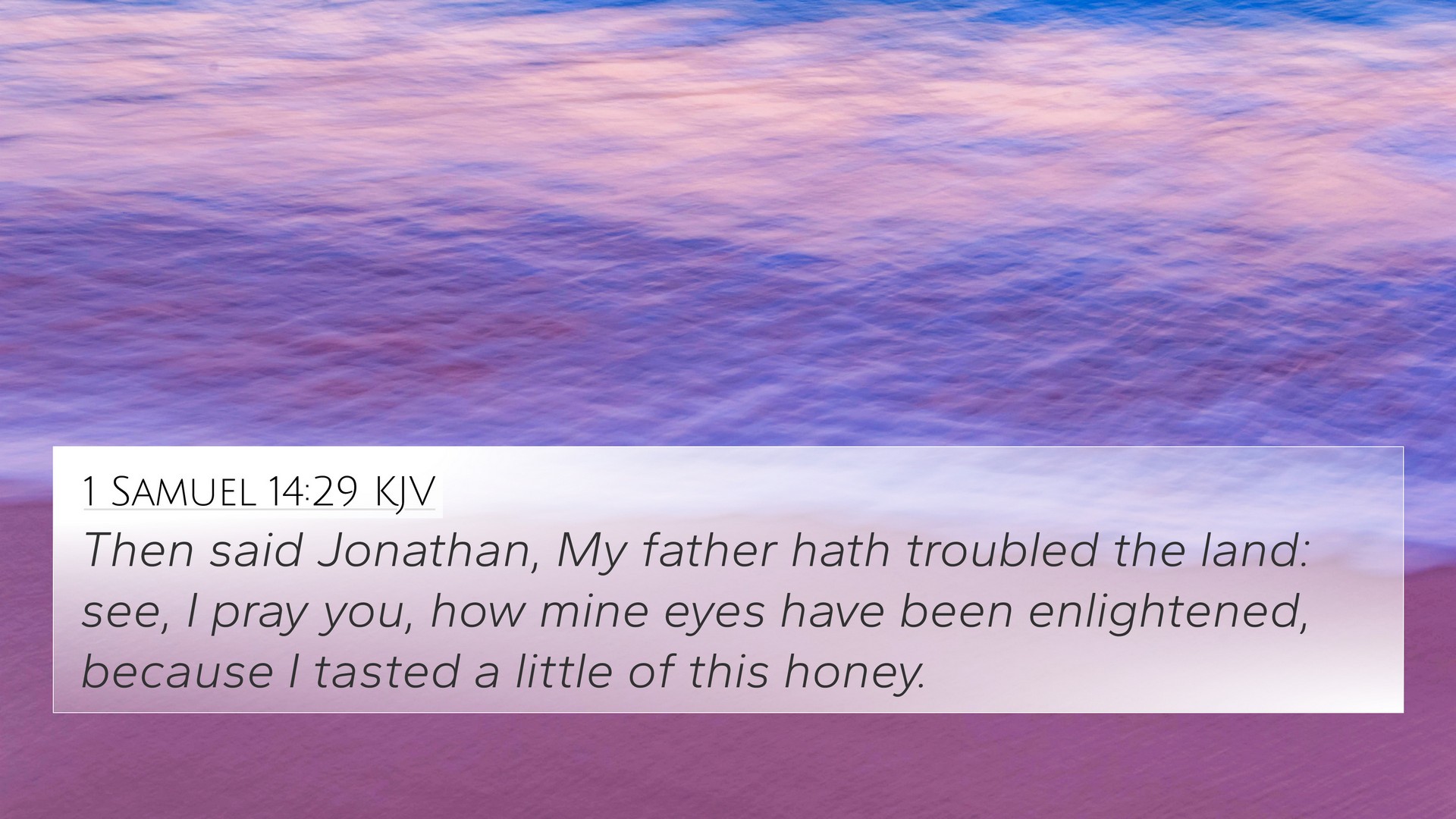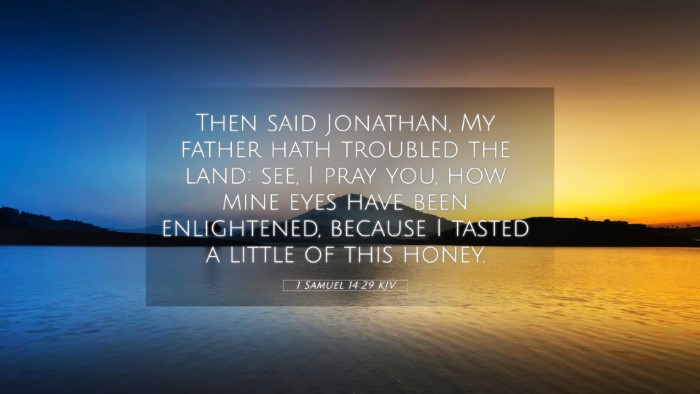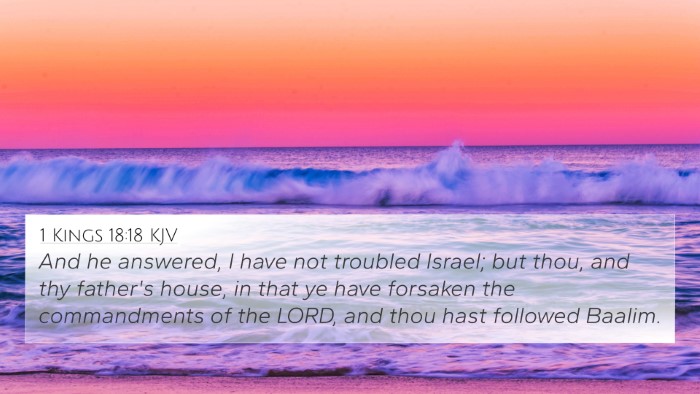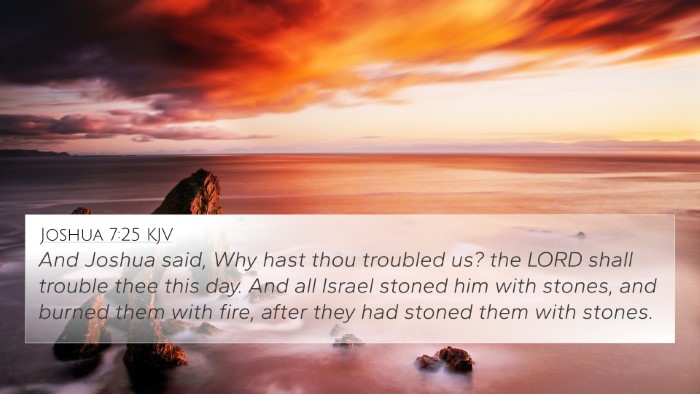Understanding 1 Samuel 14:29
Verse: 1 Samuel 14:29 – "Then Jonathan said, 'My father has troubled the land. Look now, how my countenance has changed because I tasted a little of this honey.'
Meaning and Insights
This verse reflects a significant moment in the narrative of Saul and Jonathan, illustrating the consequences of Jonathan's father's rash vow and its impacts on the people. Across various commentaries, we can gather the following insights:
- Matthew Henry: Henry explains that Jonathan's reaction signifies a deep understanding of the consequences of his father's decisions. He emphasizes that the rash oath of Saul not only affected Jonathan but also the morale of the troops, indicating a thematic link between leadership decisions and their effects on community.
- Albert Barnes: Barnes elaborates on how the honey symbolizes the sweetness of knowledge and experience that is absent in strict adherence to unwise commands. He points out that Jonathan’s tasting of the honey gives him renewed strength and clarity, reinforcing the importance of spiritual nourishment in making informed decisions.
- Adam Clarke: Clarke offers insights into the behavioral dynamics within the narrative, suggesting that Jonathan’s change in countenance symbolically reflects the transition from oppression due to Saul’s edict to the joy and revitalization provided by the honey, drawing connections to the notion of restoring joy in life amidst challenges.
Bible Verse Cross-References
To grasp the full significance of 1 Samuel 14:29, one can consider multiple cross-references that provide deeper connections and insights:
- 1 Samuel 20:28: Jonathan's loyalty to David, emphasizing the bonds of friendship.
- Proverbs 25:16: A caution regarding how much is too much – a thematic connection concerning moderation.
- 1 Samuel 14:24: Saul’s worship of his own commands brings about dire consequences.
- Galatians 5:1: Discusses the freedom that comes in Christ, related to the freedom from the burdensome laws represented by Saul's decree.
- Psalm 34:8: "Taste and see that the Lord is good," echoing the sweetness Jonathan experiences from tasting honey.
- Exodus 16:31: The sweetness of the manna, illustrating God's provision in times of need.
- Matthew 11:30: "For my yoke is easy and my burden is light," connecting to the ease we find in obeying God compared to human mandates.
Thematic Considerations
The themes illuminated in 1 Samuel 14:29 span across the trials of leadership, the consequences of rash vows, and the restorative aspects of divine provision:
- Leadership and Responsibility: The verse demonstrates the weight of leadership decisions, as Saul's imprudent command adversely affects those he leads.
- Divine Provision: Jonathan's experience with honey symbolizes God's nurturing provision that brings renewal and joy amid adversity.
- Community Impact: The decisions of leaders resonate through their communities, highlighting the importance of wise governance.
Connecting the Themes
Looking at the connections between Bible verses, this verse embodies a pivotal lesson on the ramifications of unwise leadership choices while urging believers to seek nourishment and strength from God, which can be cross-referenced with various biblical teachings about leadership, provision, and community responsibility.
Concluding Thoughts
The exploration of 1 Samuel 14:29 reveals much about the attitudes and impacts of leadership within biblical texts. Utilizing tools for Bible cross-referencing can help deepen one’s understanding and facilitate a robust engagement with the interconnectedness of Scripture.
Further Reading and Study Approaches
For those interested in a comprehensive study, consider utilizing a Bible concordance or a cross-reference guide to navigate similar themes across Scripture. Explore the connections between Old and New Testament passages, and study how various biblical figures faced challenges similar to those experienced by Jonathan and Saul.
Engaging in cross-referencing Bible study methods, and utilizing Bible reference resources will allow believers to enrich their understanding of the Scripture's deep interconnectivity and the lessons it offers for contemporary life.




